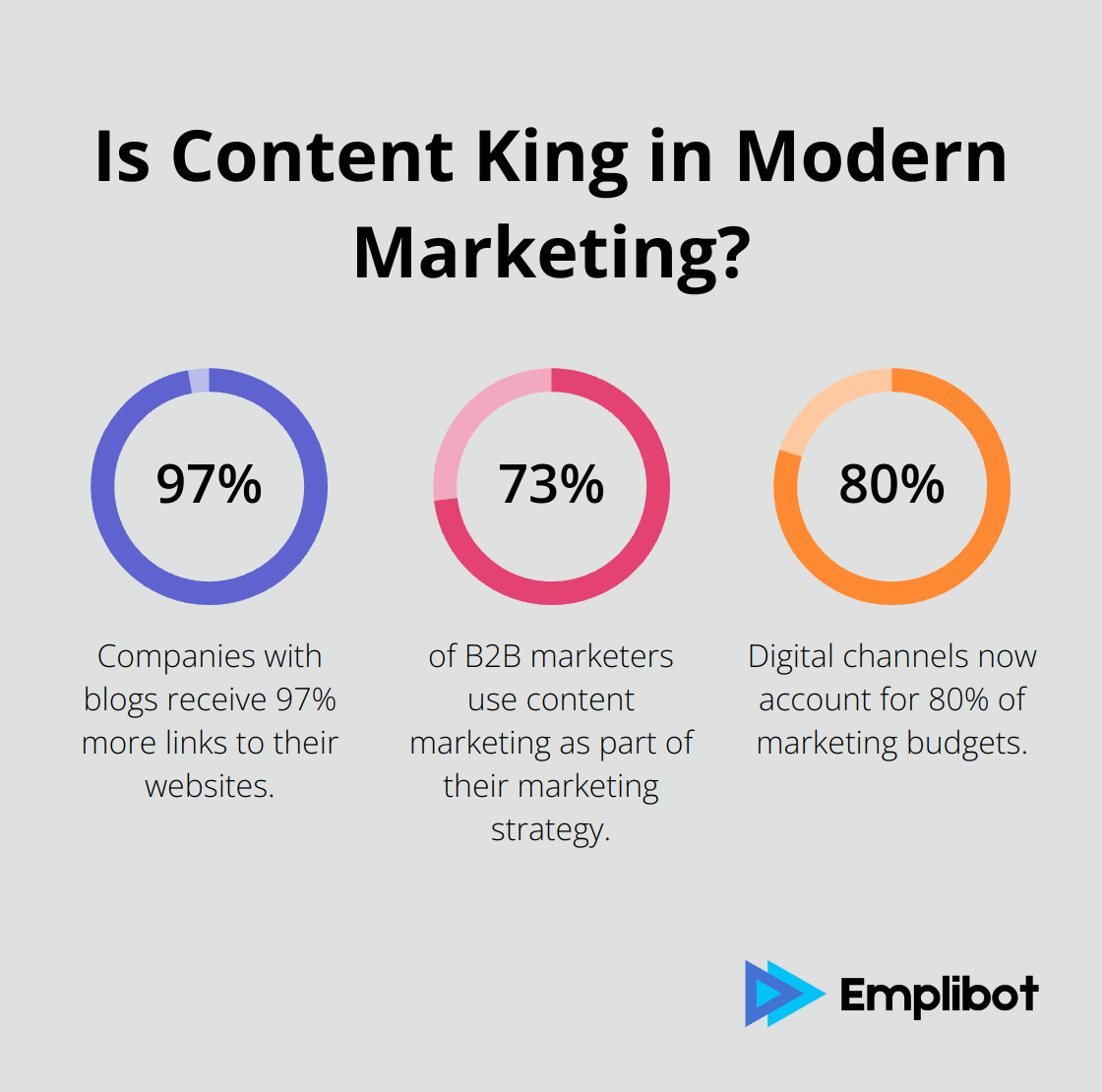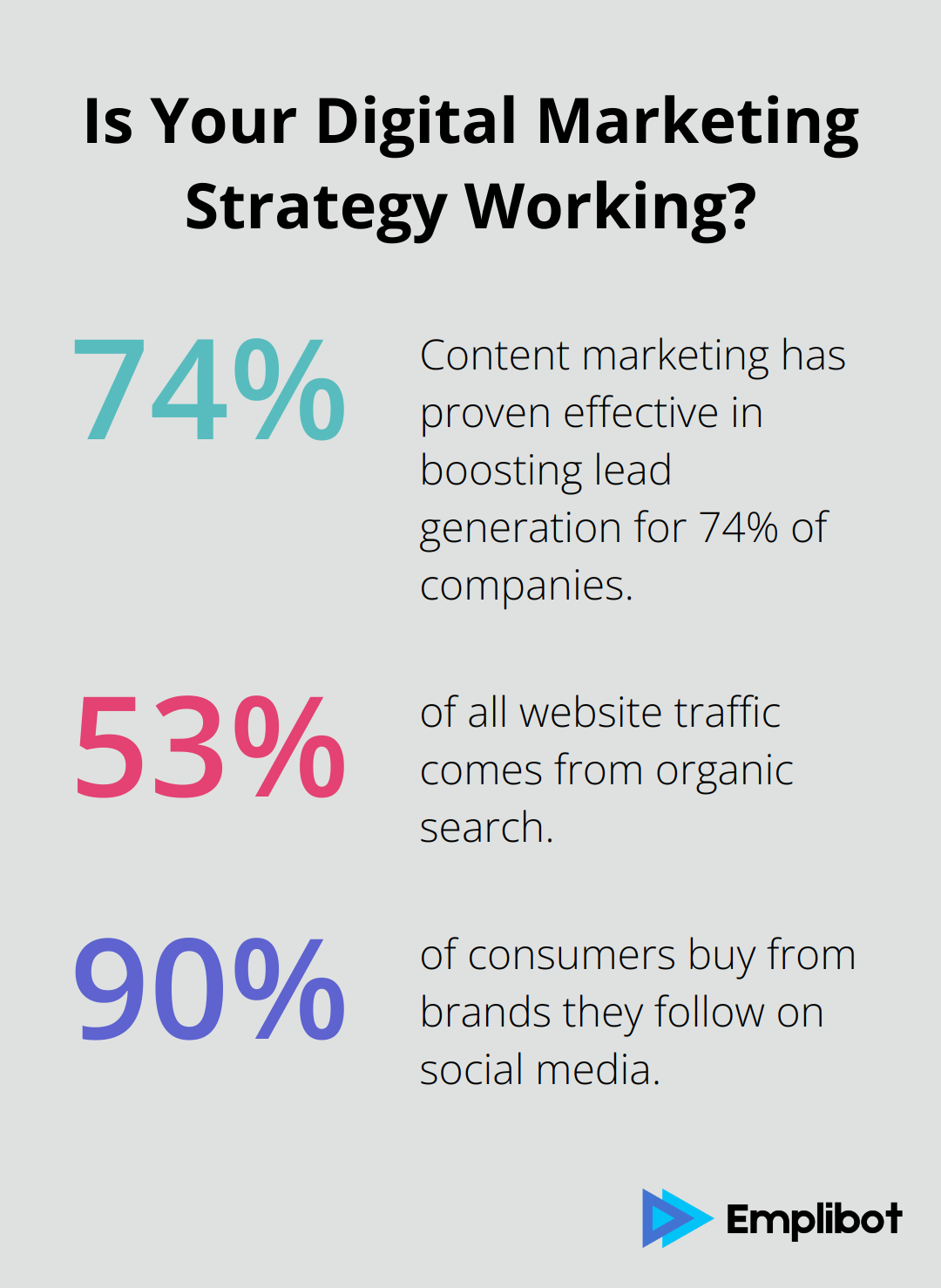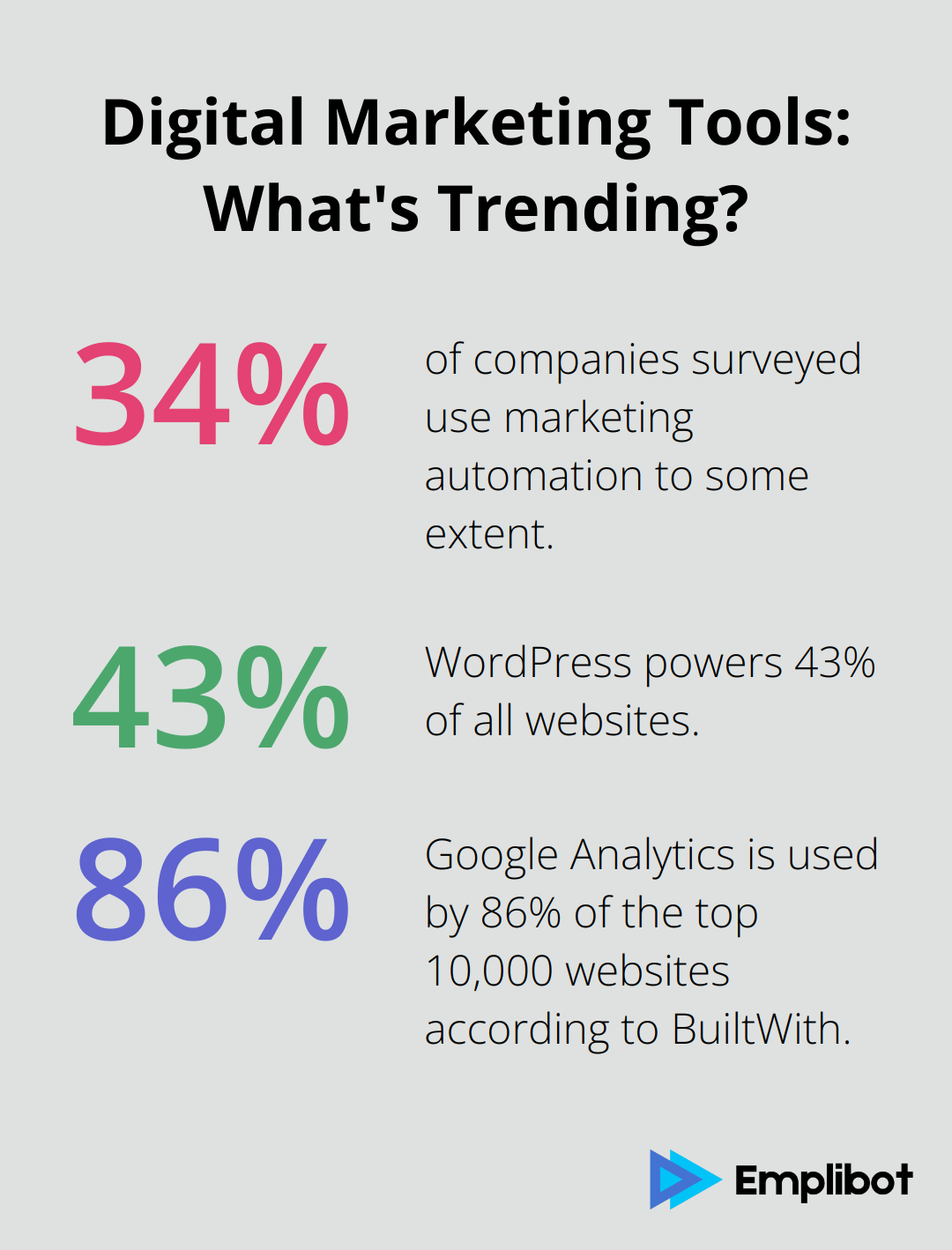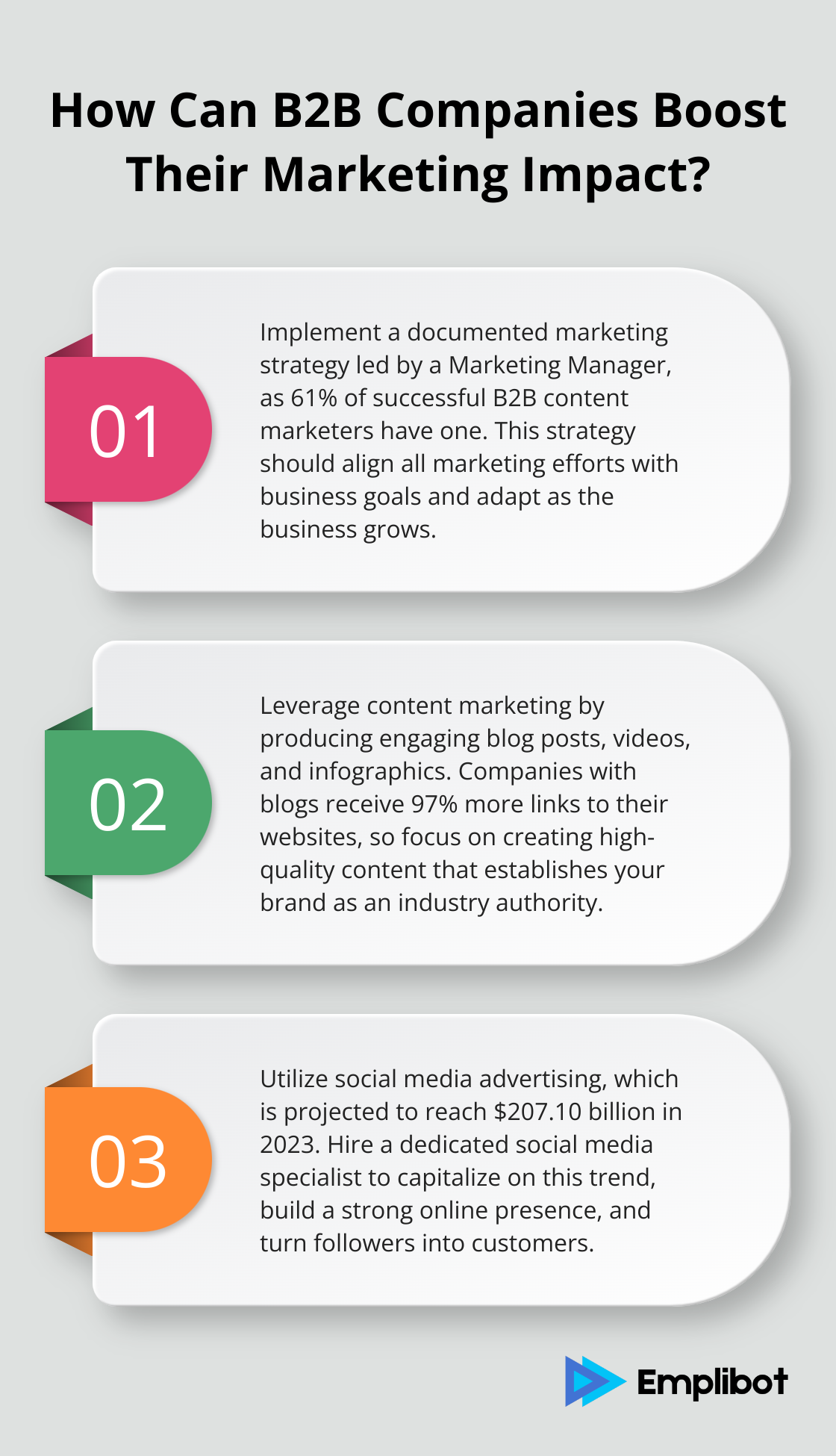At Emplibot, we understand the challenges small businesses face when building their marketing teams. A well-structured small business marketing department is key to driving growth and success.
In this post, we’ll explore the essential roles, functions, and tools needed to create an effective marketing team for your small business. We’ll provide practical insights to help you establish a solid foundation for your marketing efforts, no matter your budget or industry.
Who Should Be on Your Small Business Marketing Team?
The Marketing Manager: Your Strategic Leader
The marketing manager serves as the cornerstone of your team. This role demands a versatile professional who can oversee various marketing functions while aligning them with your business goals. They must possess a broad understanding of marketing principles and the ability to adapt strategies as your business grows.

A study by the Content Marketing Institute reveals that 61% of the most successful B2B content marketers have a documented strategy. Your marketing manager should create and execute such a strategy, ensuring all marketing efforts remain cohesive and goal-oriented.
Content Creator: Your Brand Storyteller
Content marketing is used by 73% of B2B and 70% of B2C marketers as part of their marketing strategy. A dedicated content creator helps your business stand out by producing engaging blog posts, videos, infographics, and more. This role establishes your brand voice and connects with your target audience.
HubSpot reports that companies with blogs receive 97% more links to their websites. A skilled content creator taps into this potential, drives traffic, and establishes your business as an industry authority.
Social Media Specialist: Your Community Builder
Social media offers powerful tools for small businesses. A social media specialist builds a strong online presence, engages with customers, and drives brand awareness. They create content that resonates with your audience across different platforms.
The social media advertising market is set to reach $207.10 billion in 2023, with a 4.53% annual growth rate. A dedicated social media specialist capitalizes on this trend, turning followers into customers.
Digital Marketing Specialist: Your Growth Driver
In today’s digital-first world, a digital marketing specialist becomes indispensable for your team. This role focuses on driving online growth through tactics like SEO, PPC advertising, and email marketing.
Gartner reports that digital channels now account for 80% of marketing budgets. A skilled digital marketing specialist makes the most of these channels, ensures your marketing dollars are well-spent, and drives measurable results.
While these roles prove essential, you don’t necessarily need to hire four separate individuals right away. In many small businesses, team members often wear multiple hats. The key lies in covering all these functions, even if by fewer people.
As your business expands, you might consider growing your team or leveraging tools to automate and enhance your marketing efforts. Such tools can handle tasks from content creation to social media distribution, allowing your team to focus on strategy and high-level tasks.
Now that we’ve explored the key roles in a small business marketing team, let’s examine the essential marketing functions these professionals need to perform to drive your business forward.
What Are the Core Marketing Functions for Small Businesses?
Small businesses must focus on key marketing functions to maximize their impact with limited resources. Six essential areas form the backbone of effective small business marketing.
Brand Management: Your Business Identity
Brand management involves the consistent presentation of your company’s values and personality. It extends beyond logos and colors to encompass the entire customer experience. A study by Lucidpress found that consistent brand presentation across all platforms can increase revenue by up to 23%.

To manage your brand effectively:
- Create a brand guide outlining your voice, visual elements, and core messages
- Regularly audit your marketing materials to ensure alignment with your brand identity
This consistency builds trust and recognition, which are vital for small businesses competing against larger, more established companies.
Content Marketing: Engaging Your Audience
Content marketing attracts and retains customers through valuable, relevant content. According to 74% of companies, content marketing has proven effective in boosting lead generation.
To excel in content marketing:
- Create content that solves your customers’ problems
- Use tools like Google Trends or Answer the Public to find relevant topics
- Prioritize quality over quantity (one excellent piece per week trumps daily mediocre posts)
Social Media Marketing: Building Relationships
Social media provides a direct line to your customers and an opportunity to build a community around your brand. Sprout Social reports that 90% of consumers buy from brands they follow on social media.
To optimize your social media marketing:
- Choose platforms where your target audience is most active
- Post consistently and engage with your followers
- Use social listening tools to monitor brand mentions and industry trends
Email Marketing: Direct Communication
Email marketing remains one of the most effective ways to reach customers. Email marketing drives an average of $44 for every $1 spent, making it an excellent investment for small businesses.
To improve your email marketing:
- Build your email list organically by offering valuable content
- Segment your list based on customer behavior or demographics
- Use A/B testing to optimize subject lines and content
Search Engine Optimization: Boosting Visibility
SEO is essential for online discoverability. BrightEdge reports that 53% of all website traffic comes from organic search, making it a function you can’t ignore.
To enhance your SEO:
- Optimize your website for local search (if you have a physical location)
- Create content around relevant keywords
- Focus on long-tail keywords, which are often less competitive and more specific to your niche
Analytics and Reporting: Measuring Success
Analytics help you understand what’s working and what’s not, allowing you to adjust your strategy accordingly.
To leverage analytics effectively:
- Set up Google Analytics on your website to track visitor behavior
- Use UTM parameters to track the performance of specific campaigns
- Review key metrics like website traffic, conversion rates, and customer acquisition cost regularly
These core functions form the foundation of a solid small business marketing strategy. As you implement these functions, you’ll need the right tools to execute them efficiently. In the next section, we’ll explore the essential tools and resources that can streamline your marketing operations and help you achieve better results.
Essential Tools for Marketing Success
Supercharge Your Campaigns with Marketing Automation
Marketing automation software transforms small business operations. It automates repetitive tasks, nurtures leads, and personalizes customer interactions at scale. Only 34% of companies surveyed use marketing automation to some extent, with 25% using it extensively.

HubSpot and Mailchimp offer features like email automation, lead scoring, and customer relationship management. These platforms can reduce marketing overhead by up to 12.2% (according to Nucleus Research).
Simplify Content Management for Consistent Branding
A robust Content Management System (CMS) maintains a cohesive online presence. WordPress powers 43% of all websites, making it a top choice for many businesses. It offers flexibility, a user-friendly interface, and a vast library of plugins to extend functionality.
For e-commerce businesses, Shopify provides an all-in-one solution that combines content management with powerful selling tools. Builtwith reports that Shopify powers over 4 million live websites, showcasing its popularity and reliability.
Maximize Social Media Impact with Management Tools
Social media management tools maintain an active presence across multiple platforms. Hootsuite and Buffer allow you to schedule posts, track engagement, and analyze performance from a single dashboard. These tools can save up to 6 hours per week (according to a study by Sprout Social).
While these tools offer great features, Emplibot stands out as the top choice for content creation and distribution across social media channels. It complements dedicated social media management tools, enhancing your strategy with automated content generation and distribution.
Harness the Power of Data with Analytics Platforms
Data-driven decision-making drives marketing success. Google Analytics remains the gold standard for website analytics, used by 86% of the top 10,000 websites (according to BuiltWith). It provides invaluable insights into user behavior, traffic sources, and conversion rates.
For social media analytics, tools like Sprout Social or Socialbakers offer in-depth reporting on your social media performance. These platforms help you identify top-performing content and optimize your social media strategy accordingly.
Integrate Tools for Seamless Operations
The key to effective marketing lies in choosing tools that integrate well with each other and align with your specific business needs. Try to select platforms that offer API connections or native integrations to create a seamless workflow. This approach will streamline your marketing operations, enable data-driven decisions, and help you achieve better results with limited resources.
Final Thoughts
A small business marketing department structure requires strategic planning and execution. The Marketing Manager, Content Creator, Social Media Specialist, and Digital Marketing Specialist form the core of an effective team. These roles drive business growth through essential functions like brand management, content marketing, social media, email marketing, SEO, and analytics.

Scalability and flexibility prove vital as marketing needs evolve with business growth. Start with essentials and expand gradually, focusing on efficient coverage of necessary functions rather than team size. The right tools and resources streamline operations, enhancing productivity and effectiveness (marketing automation software, content management systems, and analytics platforms stand out as key examples).
Emplibot supports your content marketing efforts by automating creation and distribution, maintaining a consistent online presence across platforms. This automation frees your team to focus on strategy and high-level tasks. Smart, strategic execution tailored to your unique business needs drives significant growth and success for your small business marketing department.

